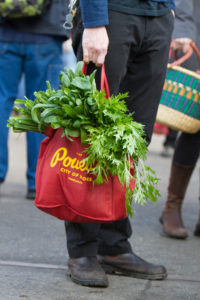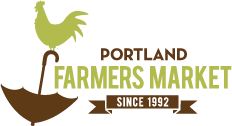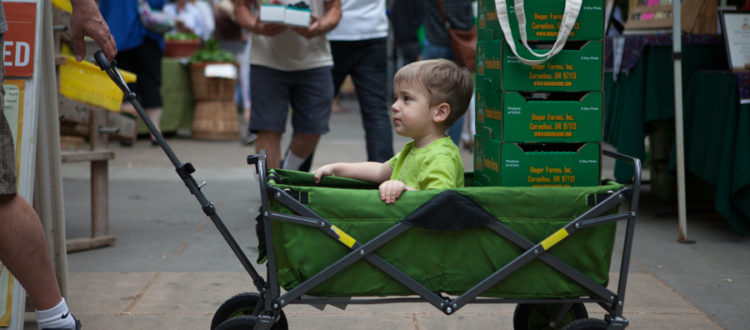Seven Farmers Market Shopping Essentials
By Kelly Merrick, Communications Manager
Shopping at a farmers market is an entirely different experience than shopping in a grocery store, and the differences can be overwhelming at first. I’ve been a farmers market customer and/or volunteer for nearly nine years and along the way I’ve learned a trick or two about how to be prepared.
You know that saying “If I had a nickel for every time…”?
Well if I had a nickel for every time a shopper told me they forgot their tote bag, I’d be dining in Portland’s most expensive restaurants. I can’t tell you how many times, as a volunteer working the information booth, I have heard that phrase, followed up with a “where can I buy a tote bag?”
Of course we all forget things now and then, but as someone who shops at a farmers market every week (sometimes multiple days per week), I’ve got a list of farmers market shopping essentials. And the good news, I’m sharing them with you below!

Photo by Alan Weiner Photography
Tote bags – Bring at least 3 tote bags with you, no matter how little you think you are going to buy. Produce can get heavy if you’re buying heavier items like squash, potatoes, jars or root veggies and it’s easier to carry multiple, lighter bags. Bags with flat bottoms are best so you can set the bag down to arrange your goodies. You can purchase a Portland Farmers Market canvas tote bag from the the information booth at any of our farmers markets for $15 or buy them online here.
Backpack – If you have a long shopping list, need to walk a long distance or if you take public transportation, a backpack is a great option. You can fit heavier items at the bottom and lighter items at the top, even letting leafy greens stick out of the top. Plus you’ll have room for your water bottle and a to-go coffee cup in the side pouches (see below).
Produce bags – I bring two types of produce bags with me – mesh bags for dry items like apples or potatoes, and plastic bags for wet, leafier items like lettuce and summer squash. I store my veggies in the same plastic bags when I get home, and then I wash and reuse them next time I visit the market. You can purchase produce bags from the information booth at all of our markets for $3 or buy them online here. You can even toss them in the wash when they get dirty. Most vendors offer free plastic bags but if you bring your own you can help conserve resources and save vendors money.
Empty containers – If you’ve ever bought a pint of strawberries only to discover they got squished on the way home, you’ll know why this is a good idea. The paper baskets vendors sell berries in are cute but no matter how careful you are, they are still likely to get squished. I bring a collection of lightweight stainless steel or plastic containers to store my fruit in so it doesn’t get bruised. For produce sold by the pint, just dump them in your container after you’ve paid for them and then hand the carton back to the vendor. If you’re buying something by the pound, you can store it in the container after you’ve paid. Some vendors sell bulk items and may even weigh the container first, subtracting the weight of the container once you’ve filled it. I buy dried beans and grains this way.
Cash – All vendors prefer cash, and if you want to be really prepared, bring small bills. It’s much quicker if you can give a vendor exact change for a $1 ear of corn or $2 zucchini rather than giving them a $20 bill. Many of our markets also have an ATM so you can withdraw cash, and most PFM vendors accept credit cards. You can also get $5 market tokens at the information booth at any of our markets. However you pay, make sure you have your money easily accessible so you can pay quickly and help the line move move faster.
Reusable water bottle & travel coffee mug – PFM does not sell bottled water so I recommend bringing your own, especially on a hot day. Each market has fill stations so you can fill up your empty bottle. It’s always a good idea to bring a travel coffee mug so you can grab a cup of coffee if the urge strikes you. We also have vendors who sell beverages like lemonade, kombucha and coffee in to-go cups.
Shopping list – Even a basic shopping list will save you time and money because you won’t wander aimlessly through the market. If you know what you want to make for meals that week, jot down a quick list of what you want to buy, or at least a general idea. When I know what is in season I make a specific list. Other times, I’ll put something general down like “veggies for stir fry” or “fruit salad ingredients” and buy what looks best. That being said, come with an open mind and willingness to try something new. Vendors are happy to give you preparation instructions.
What do you bring with you to shop the farmers market? Tell us in the comments below!

